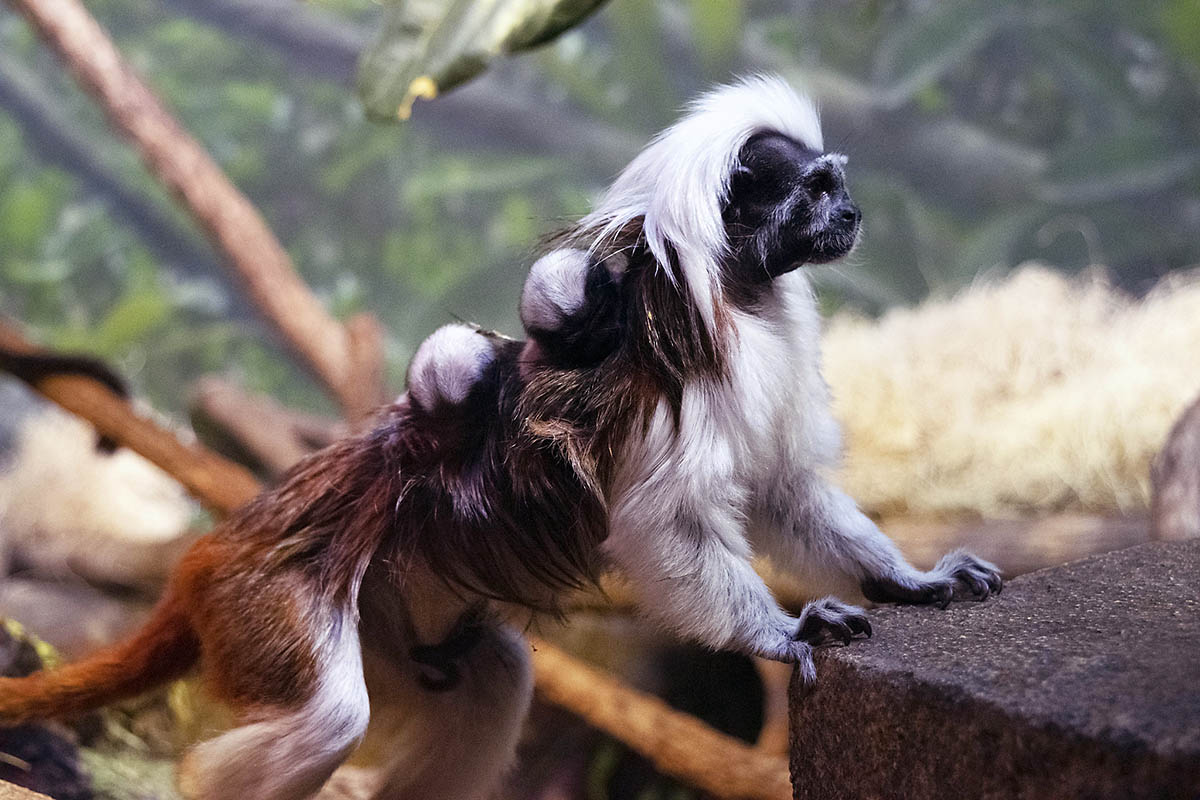 Nashville, TN – On Saturday, April 20th, 2019, two cotton-top tamarins were born at the Nashville Zoo. This is the second birth of cotton-top tamarins twins since the opening of Expedition Peru: Trek of the Andean Bear in March 2018. Since cotton-top tamarins are critically endangered in the wild, every birth of captive cotton-tops helps secure the future of this decreasing population.
Nashville, TN – On Saturday, April 20th, 2019, two cotton-top tamarins were born at the Nashville Zoo. This is the second birth of cotton-top tamarins twins since the opening of Expedition Peru: Trek of the Andean Bear in March 2018. Since cotton-top tamarins are critically endangered in the wild, every birth of captive cotton-tops helps secure the future of this decreasing population.
“Keepers have been monitoring Caqueta for pregnancy over the last several months,” said Sabrina Barnes, Nashville Zoo primate area supervisor. “Typically primates give birth overnight, but this time and the previous time, Caqueta gave birth in the late afternoon, so keepers were able to monitor the birth and watch the rest of the three tamarins interact with the mother and infants.”

Cotton-top tamarins live in family groups that consist of the mother, the father and several generations of offspring.
Nashville Zoo is now home to six cotton-top tamarins: Caqueta, 5; Pancho, 14; Mateo, 1; Rosemira,1; and the two infants. All of the group members assist the mother with carrying the infants around. This gives the mother a break and it also helps the previous generations of offspring learn how to become good parents.
“Mateo, the older brother who was born last May, was the first of the group members to hold the new infants,” Barnes said. “Caqueta is calm and encourages the older siblings to carry the infants around. The group tends to stick very close to each other as each family member is eager to assist the new mom with caring for the infants.”
This is the third birth for Caqueta and Pancho since arriving at Nashville Zoo in 2016. The first birth resulted in the infant dying on the third day because of internal complications.
“Cotton-top tamarin infants have a high mortality rate for the first week of life, so keepers are closely monitoring the babies over the next several weeks to make sure that they continue to appear healthy and nurse,” Barnes said.
It is estimated the new infants weighed around 40 grams each at birth. Keepers are unable to identify sex at this moment because the infants are too young. These babies will stay at the Zoo until they are sexually mature and then they will go on to breed at other zoos. The family group can grow larger as it accommodates multiple generations of offspring before they emigrate from the group.
The cotton-top tamarin is one of the most endangered South American primates and gets its name from the mane of white fur around its face. This species lives in the forests of Colombia and are about 9 inches long. They eat fruits, flowers, nectar, plant gums, saps and latex, as well as small animal prey.
The cotton-top tamarin is listed as critically endangered due to deforestation and the pet trade. Nashville Zoo is part of AZA’s cotton-top tamarin Species Survival Plan® and also contributes financially to Proyecto Titi, a conservation program designed to provide useful information to assist in the long-term preservation of the cotton-top tamarin and to develop local community advocates to promote conservation efforts in Colombia.
The cotton-top tamarin exhibit is located as a specialized exhibit in the women’s restroom in Expedition Peru, similar to the python exhibit in the men’s restroom in Entry Village.
About Nashville Zoo
Nashville Zoo is a nonprofit organization and an accredited member of the Association of Zoos and Aquariums, assuring the highest standards of animal care and husbandry. The Zoo is actively engaged in conservation research, habitat protection, breeding programs and education initiatives around the globe as well as in our own backyard. The Zoo attracts more than 1,000,000 visitors annually and is considered one of the top attractions in Nashville.
Nashville Zoo is located at 3777 Nolensville Pike and is open every day except Thanksgiving, Christmas and New Year’s Day. For more information about Nashville Zoo, visit www.nashvillezoo.org



